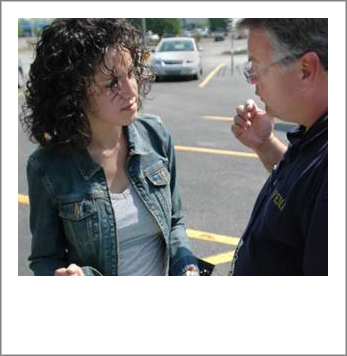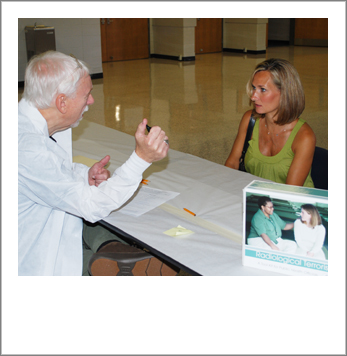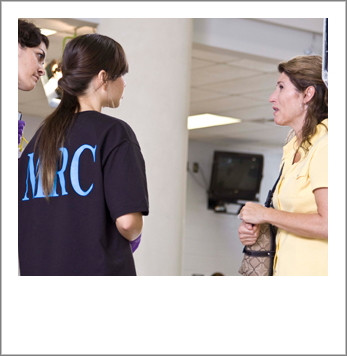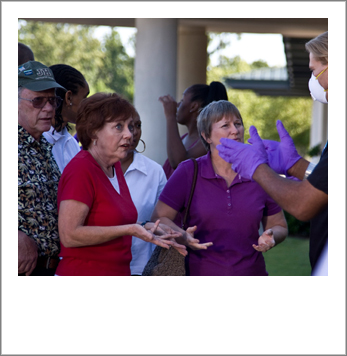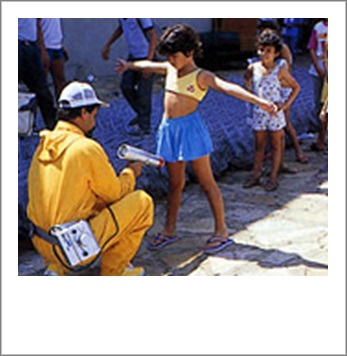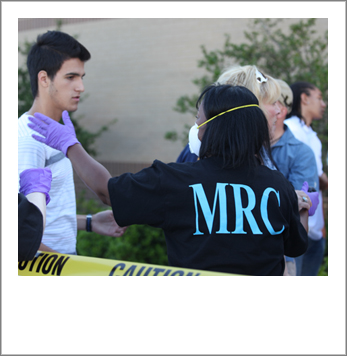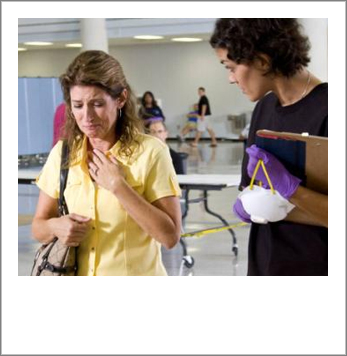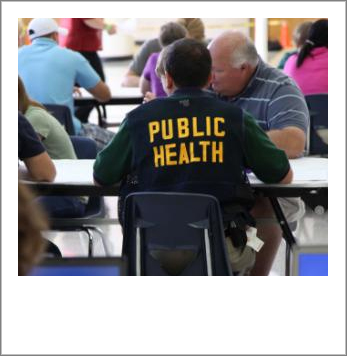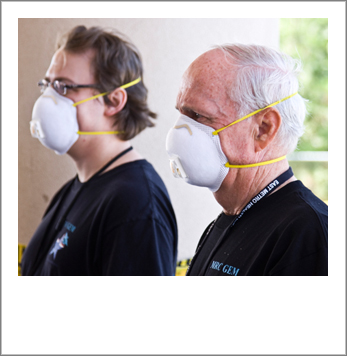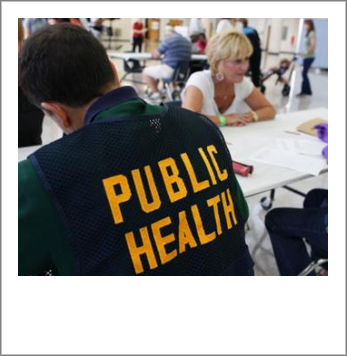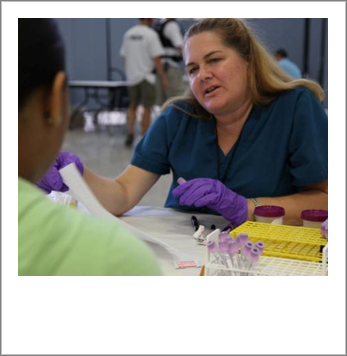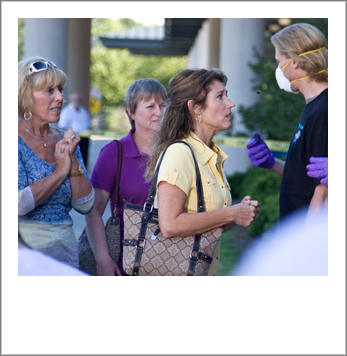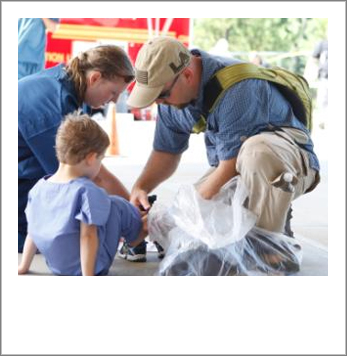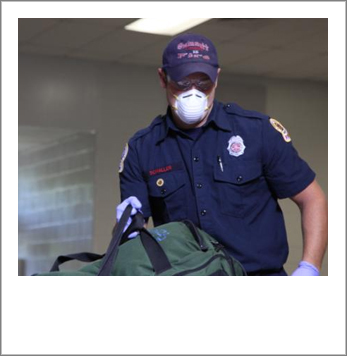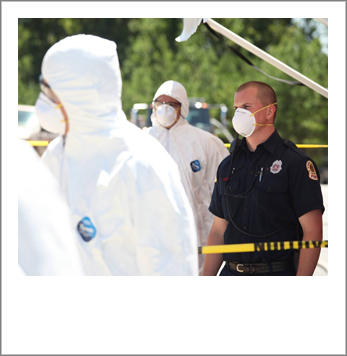Psychological First Aid Managing Emotions
Disasters provide many opportunities for the expression of intense emotions. Individuals can become extremely agitated and aggressive or extremely emotional. Remember, you can be the most helpful by remaining calm yourself and communicating calmly.
This can be enhanced by a number of nonverbal strategies. For instance, stand or sit squarely facing the survivor. Keep your posture open - meaning try not to cross your arms or legs. Both of these techniques communicate your openness and total attention. Lean forward , and keep eye contact. These strategies communicate your interest and care as the survivor is speaking.
Being attentive does not mean allowing yourself to verbally or physically abused. Sometimes there are personality conflicts and it may be best if you walk away and try to get another worker to assist that survivor.
Next, communicate warmth. You can do a lot to defuse intense emotions by using a soft tone while speaking. Remember to give survivors their personal space and allow them to dictate the physical distance they want from you. Do all that you can to quickly establish a relationship with the survivor.
You can do this by introducing yourself and asking the survivor what name he or she would like to be called. Let the survivor know you are there because you want to help. One strategy to defuse intense emotions is to lead the survivor to focus on concrete, closed-ended questions or questions that involve a straightforward answer. Always explain why you are asking the question. Simple questions require simple responses from the survivor and often defuse high emotions.
Intensely emotional survivors often feel they are not being heard. You can de-escalate the situation by finding something you can agree on. For example, if the person is extremely frustrated and angry over his or her ability to move quickly through a line, maybe you could agree that waiting in long lines is frustrating and is a very valid concern and needs to be addressed. Then let her or him know that you will work with her or him to help solve this problem.
Sometimes when emotions are intense and directed at you, it is easy to forget to be respectful. Remember to continue to speak in a respectful way. Use “please” and “thank you,” use positive language, don’t generalize or make global statements, and don’t lavish praise. Your respectful treatment gives survivors a sense of dignity and self-efficacy.
However, after trying these management strategies, if the individual becomes threatening and intimidating and does not respond to your attempts to calm him or her, seek immediate assistance.
Now we will return to the first-hand accounts of two radiological disasters for examples of handling intense emotions. David Houts, who was a child at the time of the accident at Three Mile Island , will share what he found most comforting as he coped with the stress of the crisis.
Then Dr. Jose Rozental, who was the director of the Department of Nuclear Installation and Materials at the Brazillian National Commission of Nuclear Energy, will discuss his interactions with victims of the Goiânia disaster.
Listen for how each manages emotions—both his own and others.
Disasters provide many opportunities for the expression of intense emotions.
You can be the most helpful by remaining calm yourself and communicating calmly.
- Stand or sit squarely facing the survivor
- Keep your posture “open” (no crossed arms or legs)
- Lean forward
- Keep eye contact
Being attentive does not mean allowing yourself to be verbally or physically abused.
Communicate warmth:
- Give survivors their personal space
- Introduce yourself and ask the survivor what name they like to be called
- Lead the survivor to focus on concrete, closed-ended questions or questions that involve a straightforward answer
Intensely emotional survivors often feel they are not being heard.
When emotions are intense and directed at you, it is easy to forget to be respectful.
Use “please” and “thank you,” use positive language, don’t generalize or make global statements, and don’t lavish praise.
If the individual becomes threatening and intimidating and does not respond to your attempts to calm him or her, seek immediate assistance.
David Houts, who was a child at the time of the accident at Three Mile Island, will share what he found most comforting as he coped with the stress of the crisis.
Dr. Jose Rozental, who was the director of the Department of Nuclear Installation and Materials at the Brazilian National Commission of Nuclear Energy, will discuss his interactions with victims of the Goiânia disaster.
David Houts
Former resident — Harrisburg, Pennsylvania
Dr. Jose Rozental
Former Director of Department of Nuclear Installation and Materials
Brazilian National Commission of Nuclear Energy
As you can see, managing emotions in a disaster can be difficult. Ideally, a disaster response team will include mental health professionals trained in disaster response who are part of the assessment, treatment, and follow-up for survivors.
However, in many locations, mental health professionals, particularly those with disaster response training and experience, may not be available, especially in the first hours or days after an event. If mental health services are not available at your location, identify community resources that may be called upon to assist survivors prior to any need. This should be part of your community’s all-hazards response plan.
Sometimes you can serve the survivor best by making what is known as a referral. A referral is recommending that a survivor speak to a professionally trained expert who is more competent to handle the difficulties and complexities of their needs. As a responder, you would refer the survivor to a person in consultation with your site supervisor or the overall person in charge at your emergency location.
There are situations that would warrant making a referral. Three examples of extremely serious situations that would require a referral are: when a person hints or talks openly about suicide, when the possibility of child abuse exists, or when the possibility of criminal activity exists. A person appearing socially isolated or having imaginary ideas or feelings of persecution should also be referred for more care. Always refer if you feel the problem is beyond your training or capabilities.
Finally, always make a referral if you are aware that the survivor is drug- or alcohol-dependent, if the person is engaging in risky or threatening behavior, or if you have difficulty maintaining real contact with the person.
You might need to seek help for yourself from a mental health professional if you become restless or confused, having negative recurring thoughts or dreams about work, or feel that you are the only one who can help. As a responder, you must take care of yourself before you can help survivors. Remember, the survivor always has the right to refuse any and all social or behavioral services including a referral.
Nevertheless, all states have laws governing the commitment of individuals who are deemed dangerous to themselves or others and laws governing the protection of children. Short of these issues or the presence of criminal activity, no one can be forced to accept any services.
Confidentiality is a right held by the survivor and it involves information regarding the identity of the survivor and services he or she receives. Helping a person is a privileged position and builds on trust and respect. You build that trust and respect as you keep discussions you have had with survivors confidential and private.
You should not share discussed information without the survivor’s consent. The exception would be if you believe the person will harm himself or herself or others, or is participating in criminal activity or if there is the possibility of child abuse.
There are several important considerations when assisting survivors of radiation disasters. Social stigma, or the unwillingness to interact with persons exposed, or potentially exposed, to radiation, can reduce social supports and hinder resilience and recovery.
In addition, for some, stigma or shame is associated with receiving mental health services. This may also affect a survivor’s ability to recover.
In radiological disasters, the groups who are most at risk include women with young children, pregnant women, children, first responders , evacuees, individuals with limited social support, those with a prior trauma history, and those with mental illness.
It should be noted that Emergency Medical Service professionals, fire personnel, and police officers often have extensive exposure to trauma, from which they have survived and recovered. This may give them a false sense of confidence. The scale of the disaster may be so great that their previous resilience factors may be insufficient to help them cope.
No matter the scale of the disaster, even the most experienced public safety personnel should be committed to examining themselves and peers for signs of psychological trauma.
Now that we have learned some strategies, let’s see how they might be used in an actual radiation disaster.
Managing emotions in a disaster can be difficult.
In many locations, mental health professionals, particularly those with disaster response training and experience, may not be available.
Identify community resources that may be called upon to assist survivors prior to any need.
Sometimes you can serve the survivor best by referring them to a mental health professional.
This is especially the case when:
- A survivor hints or talks openly about suicide
- There is a possibility of child abuse
- There is a possibility of criminal activity
Other cases for referral can be when:
- The survivor seems to be socially isolated
- The survivor feels persecuted
Always refer if you feel the problem is beyond your training or capabilities.
Make referrals for:
- Drug or alcohol dependent individuals
- Individuals engaging in risky or threatening behavior
- Individuals for whom it is difficult to maintain contact
As a responder, you have to take care of yourself before you can take care of others!
The survivor always has the right to refuse any and all social or behavioral services including a referral.
All states have laws governing commitment of individuals deemed dangerous to themselves or children.
Confidentiality is a right held by the survivor.
You should not share discussed information without the survivor’s consent.
The exception would be if you believe the person will harm himself or herself or others or is participating in criminal activity or if there is a possibility of child abuse.
Unwillingness to interact with persons exposed or potentially exposed to radiation can reduce social supports and hinder resilience and recovery.
Additionally, stigma or shame can be associated with receiving mental health services.
In radiological disasters, the groups who are more likely to develop significant psychological issues include:
- Women with young children
- Pregnant women
- Children
- First responders
- Evacuees
- Individuals with limited social support
- Individuals with a prior trauma history
- Individuals with mental illness
Even the most experienced public safety personnel should be committed to examining themselves and peers for signs of psychological trauma.


